World-class musician talks about playing bass for Ray Charles and Buddy Rich and why he decided to re-release his critically acclaimed solo CDs after 20 years!
Exclusive interview with FBPO’s Jon Liebman
April 26, 2010
Curtis Ohlson is widely regarded as a world-class musician, producer, and composer. Curtis’ original development was influenced during the years he spent as the bass player for music legends Ray Charles and Buddy Rich. Curtis then went on to work with numerous successful artists including, Branford Marsalis, Sheila E., George Duke, Bob Weir, Peabo Bryson, Pee Wee Ellis & Fred Wesley, Pete Escovedo and many others.
With over fifty albums, countless worldwide concert tours and several major movie sound track recordings to his credit, Curtis is now focusing more time and energy on music production and recording. His solo albums, Better Than Ever and So Fast, both recorded in the late 1980s, were re-released on CD in 2009.
FBPO: Tell me about your musical upbringing. Where did you grow up? How did you become a musician?
CO: I grew up in Pittsburg, California, which is about 40 miles east of San Francisco. I think at about the age of 4, I heard a band down the street playing songs like “Louie Louie,” “Little GTO,” stuff like that. You know, they were like a top 40 band with cool hairdos. I was just enamored and I wanted to be a musician ever since that day!
In fifth grade I asked to play in the school band. The teacher checked everyone’s hearing to see if we could tell the difference between pitches and stuff or if we were tone deaf. I scored high on the hearing test and he told me he wanted me to play the violin. But I said, ”Aw man, I want to be in a rock band dude, you know. I want to score chicks and be in a rock band.” That was my goal. I told him I wanted to play saxophone and he said no, he wanted me to play clarinet. So that’s what I did. I started playing clarinet.
FBPO: How did you end up a bassplayer?
CO: How I got into bass was really weird. In about seventh or eighth grade, I wanted to start a rock band, so I bought a drum set with the money I got from selling my mini bike. I had a band with two drummers and two guitar players. One of my best friends played drums and he’d started about six months before I did, so he was a better player. After our first rehearsal, I went out and collected money from my paper route and bought a bass guitar for twenty bucks. That’s how I started playing bass!
FBPO: Was there a turning point in your life that made you realize you were actually going to be able to have a career as a musician?
CO: When I was in high school, I just kept committing and practicing as much as possible. Then, as a student at Los Medanos College, I remember telling my professor, John Maltester, that I’d be moving out of my parents’ house in another year or so and asking him how I can make a living in music. He said, “You should practice as much as possible on your own, study classical symphony music, play in an orchestra, play in the jazz ensembles here, play in funk bands on your own and completely commit and dedicate yourself to music.” I did what just what he said. A year later he told me that I kind of scared him. I did music from sunup to sundown. That’s all I did at that time in my life!
FBPO: How did the Buddy Rich gig come about?
CO: Aw man… the Buddy Rich gig! I was twenty-two years old, on the road with Ray Charles at the time. We were in New York City getting ready to go to Europe. I had seen Buddy in Memphis, Tennessee, a few weeks before and thought, “Boy, I’d like to play in his band!” Someone in New York told me that Buddy was looking for a bass player. I had a demo tape with some original material, so I dropped it off with Buddy’s road manager before heading off to Europe for a month with Ray Charles.
After Europe, I had two weeks off and was visiting my mother when I received a call from Buddy’s road manager. He said Buddy liked the tape and wanted me to do five nights with him on the east coast. I said, “Sure,” and asked what happened to the other bass player. I found out that Buddy had gone through eight bass players in the month that I was in Europe! That meant he went through two bass players a week! No audition, no rehearsal. He just hires you and then fires you! So I arrived in Niagara Falls and they handed me a book with about three hundred forty songs in it. I kind of looked a few charts over that night in my hotel room. When I got on stage the next day, I just frickin’ sightread my ass off! I toured with him for six months and recorded a studio album with him, The Buddy Rich Band, for MCA Records.
FBPO: How about a good Buddy story? Come on, you’ve got to have one!
CO: OK, man. The first week I was performing with Buddy, we played a college theater somewhere in Massachusetts. Buddy called a blues tune, but there was no chart for it. So I looked over at the pianist while we were playing for the turnaround and Buddy starts rushing and slowing down the tempo. Every time I looked back at the piano player, Buddy would start rushing or dragging the tempo. And then a fire alarm started going off. Everyone evacuated the theater till pretty soon it was just Buddy and me on stage. And he starts yelling at me, “Okay, you young fuckin’ hot shot! If you want to fight me I’ll take you out behind the gymnasium and kick your ass! Nobody fights me on stage. If I speed up, you speed up with me. I’m not a fuckin’ dance drummer. You follow me. This is my fuckin band!”
The moral of this story is: All eyes on Buddy all the time! I got a lot out of playing with him because he played his ass off every night!
FBPO: Your association with Ray Charles seems to be especially meaningful to you. Am I right?
CO: Yes, you are very right. My association with Ray Charles was very meaningful to me. Some of the things he taught me about music and life took years for me to grasp. He may have been narcissistic in some ways, but when we were on stage he always gave 100%, musically. After he died, I had dreams about him for a couple of years — positive dreams, where I would wake up with a smile on my face, as if he were talking to me. I feel touched and blessed to have spent so many years with Brother Ray, on and off stage.
FBPO: How would you describe your solo albums, Better Than Ever and So Fast?
CO: Growing up in the Bay Area, I was always into funk and jazz and R&B and tried my best to combine those elements on my solo albums. I brought in guests, such as Branford Marsalis, Marc Russo, William Kennedy, Pete Escovedo and Rosie Gaines, and wrote songs that captured the spirit of life as I knew it in the Bay Area.
FBPO: What made you decide to re-release them after all this time?
CO: Originally So Fast and Better Than Ever were only available on vinyl, cassette and a limited number of CDs. Over the years, a lot of people asked me where they can get my CDs, so I decided to re-master them and release them, with the help of Voiceprint Records from England. I want your readers to know that both of my CDs, So Fast and Better Than Ever are available here on your website. [Editor’s note: They are. Now you know!]
FBPO: What’s keeping you busiest these days?
CO: Life, music and the pursuit of happiness! Namely, music production and writing in my recording studio, Ohlsonic Studios.
FBPO: What lies ahead for you and your career?
CO: I am currently working on my third solo album for Voiceprint Records. I plan on touring with my own band in the near future, too.
FBPO: What do you like to do when you’re not involved in making music?
CO: I really enjoy weightlifting, yoga and swimming. Exercise always inspires me and puts me in a great mood!
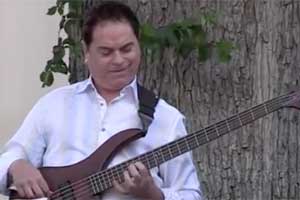
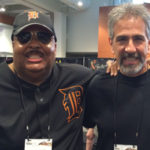

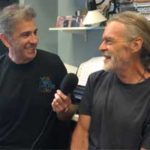
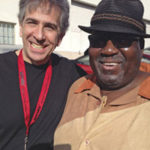
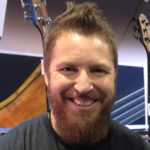
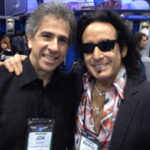

Excellent article! Curtis is the epitome of following your dream and realizing it. And he’s a hell of a nice guy too!
Thanks, Mac. Glad you liked the interview!
I’ve known Curtis Ohlson for years and he is one bad ass MF. My first time hearing him was while he was playing with Marc Russo from the yellow jackets at the Diablo valley college where they were both studying as teenagers. You could see his supernatural Sense of groove developing even then. I’m glad he’s happily semi retired and able to reflect on an impressive career.
Very cool, Marc! Thanks for posting that.